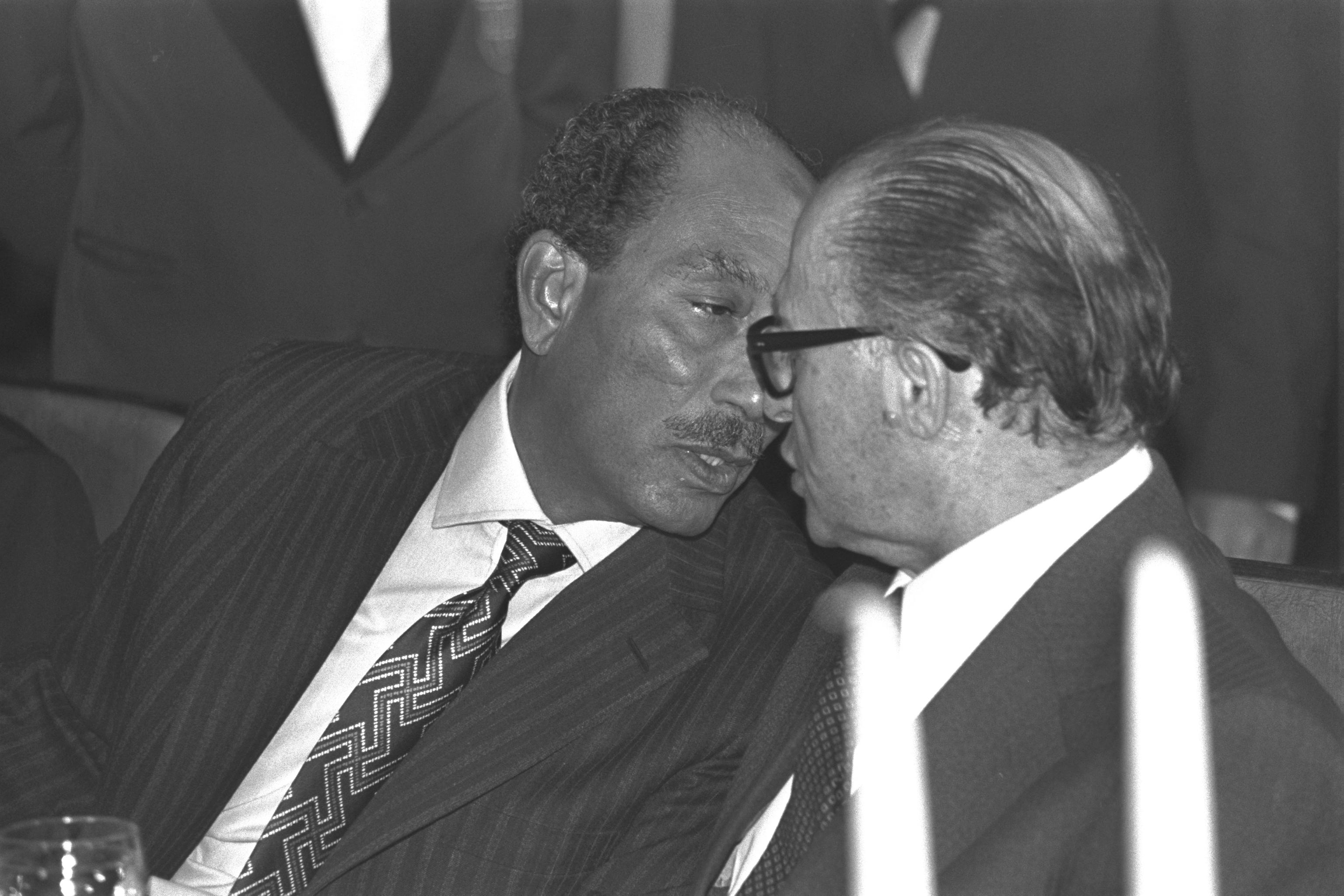 Egyptian President Sadat and Israeli Prime Minister Menachem Begin at the King David hotel in Jerusalem, 1977 (Reuters)
Egyptian President Sadat and Israeli Prime Minister Menachem Begin at the King David hotel in Jerusalem, 1977 (Reuters)
U.S.
Brian Katulis and Yoram Schweitzer describe concerns heard in Israel about the Trump administration’s Middle East policy:
Put simply, the Trump administration’s unclear and disjointed approach to the Middle East has unnerved key allies like Israel while giving the emerging coalition of Russia, Iran, Syria, and Hezbollah a free pass. Many Israelis were dismayed earlier this week when Russian Foreign Minister Sergei Lavrov stated that Iran’s presence in Syria was legitimate and that they would not force Iranian-aligned Shiite militias to withdraw from positions close to Syria’s border with Israel.
Jonah Goldberg explains why Putin isn’t interested in helping America:
Trump believes that every country should follow its own narrow self-interest. That’s a defensible position. The only problem is that Russia’s — or at least Putin’s — definition of self-interest is at war with ours.
Israel
Aviad Kleinberg tries to figure out why Avi Gabbay has been shooting his own political camp in the foot:
But Gabbay isn’t producing such a complicated display. He is producing a simple and completely coherent display of a rightist. Granted, he is a rightist who opposes corruption, but the Bibi government’s corruption isn’t part of the right-wing agenda anyway, rather something right-wing voters are willing to accept. That being the case, they would rather vote for the real thing than for someone who talks like a rightist.
Israeli Consul Yehuda Yaakov takes a moment to remember Anwar Sadat’s historic visit to Israel, 40 years ago today:
Last week I hosted in Boston recently-retired Israeli Supreme Court Justice Elyakim Rubinstein, who was part of the Israeli team at the Camp David talks with Egypt. He described waiting for Sadat at Ben-Gurion Airport as the most significant experience of his professional career. In his words, it was as if he could “hear the wings of history.”
Rubinstein recalled being told at the time by an otherwise skeptical Israeli minister: “Look, if this is hopeful in another 15 years, I’ll think the price was worthwhile.” Forty years later, with tensions between Israel and Arab states on the decline, I believe that the price was categorically worthwhile.
Middle East
Emile Hokayem writes about the Saudi government’s struggle to tame Iran:
Fundamentally, who prevails in the rivalry between Tehran and Riyadh comes down to capacity and competence. Iran has the networks, expertise, experience and strategic patience required to fight and win proxy wars at low cost and with plenty of disingenuous deniability. The Saudis simply don’t, which is why seeking to beat the Iranians at this game is dangerous and costly.
Mustafa Akyol explains why Erdogan has surprisingly been embracing the Ataturk legacy these days:
Yet there is an important nuance between the image of Ataturk with which Erdogan now identifies and the image of Ataturk that Turkey’s “Ataturkists” have traditionally upheld. In the latter one, Ataturk was a Westernizer who secularized his nation with top-down “reforms” during his absolute presidency from 1923 to 1938. Erdogan and his followers understandably skip those un-Islamic themes. The Ataturk they rather like is the anti-Western war hero who saved the motherland from the occupation by European imperialists in 1919-1922. This also allows them to argue that Erdogan is not “undoing Ataturk,” as the Ataturkists typically claim. Erdogan, in this view, is only re-doing Ataturk by making Turkey “independent” again.
Jewish World
Susan Weiss has a modest proposal to settle Israel’s problem with Agunot, women unable to remarry because their husbands refuse to grant them a religious divorce (a get):
So here’s my (obviously tongue-in-cheek) Modest Proposal. It’s based on the now discovered “solution“ to the problem of agunot, ie: ex-parte restraining orders that prevent tourists from leaving the country they are visiting. I suggest that Israel enter into a multi-national agunah treaty with all the other nations in the world. The treaty will provide that all nations have the right, and indeed the obligation, to unilaterally, ex-parte, and on the basis of one party‘s pleading, temporarily restrain the travel of all Jewish tourists who are suspected of being get refusers — including, of course, Israeli tourists. If a tourist happens to give a get under the hurried circumstances of an ex-parte restraining order in a foreign county, the get will not be considered invalid or “forced.”
Responding to Martin Kramer, Professor Michael Mandelbaum points out the ordinary aspects of Israel’s struggle for independence:
To be sure, the Jews have had to fight harder and longer for their state than have many other nations; but the difference is one of degree. Much of the large-scale violence of the last 100 years, and most of it during the last three decades, has had as its cause the related questions of who gets a state and where states’ borders begin and end. Israel’s experience is all too typical.























 More news and opinions than at a Shabbat dinner, right in your inbox.
More news and opinions than at a Shabbat dinner, right in your inbox.